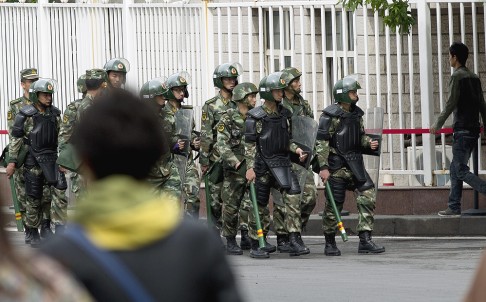Xinjiang police detain five after hoard of bomb-making materials seized
Arrests follow Urumqi market attack last week that left 43 people dead as Beijing continues security crackdown focusing on suspected terrorists
PUBLISHED : Tuesday, 27 May, 2014, 12:13pm
UPDATED : Tuesday, 27 May, 2014, 5:20pm
Agence France-Presse in Beijing

Armed paramilitary policemen patrol in Urumqi on Monday. Photo: AP
Police in China’s Xinjiang have seized 1.8 tonnes of bomb-making material and detained five people, authorities said on Tuesday, following a string of deadly attacks blamed on militants from the Muslim Uygur homeland.
China at the weekend vowed a year-long crackdown on terrorism, with violence attributed to separatists from Xinjiang increasingly targeting civilians and spreading far outside the western region in recent months.
Last week five suspects killed 39 people and wounded more than 90 in a car and bomb assault on a market in the regional capital Urumqi, in an attack condemned as terrorism by both Beijing and Washington. Four of the attackers also died.
Officers in and around Hotan in southern Xinjiang “destroyed two explosive-making dens and seized 1.8 tonnes of raw material that the gang planned to use to make explosive devices, along with a large amount of partly finished explosive devices”, reported the regional government’s Tianshan website.
In recent days the group began making explosive devices with the goal of “driving into a crowded place, running people over and setting off bombs” in Hotan, it said.
The gang had watched videos promoting terrorism and religious extremism, it added, and said the group’s leader had instructed members to acquire materials from Urumqi and elsewhere in China.
On April 30, the final day of a visit by Chinese President Xi Jinping to the region, attackers armed with knives and explosives killed one person and wounded 79 at an Urumqi railway station.
In March knifemen killed 29 people and wounded 143 at a railway station in the southwestern city of Kunming, an incident dubbed “China’s 9/11” by state media.
Authorities have vowed to crack down and taken the rare step of deploying more armed police in major cities, but also emphasised the need to improve ethnic integration, education and employment in Xinjiang.
China’s most powerful body, the Politburo Standing Committee, agreed at a meeting on Monday that “cracking down on violent terrorist activities must be the focal point of the current struggle”, the official news agency Xinhua reported.
“Ethnic separatist activities must be resolutely opposed and lawfully combated,” it said.
At the same time the committee pledged to expand bilingual education, make high school free in southern Xinjiang, and ensure that at least one member of every family had a job, among other measures.
Police arrested more than 200 suspects and seized more than 200 explosive devices around Xinjiang over the past month, state-run media said at the weekend.
More were detained across Xinjiang on Monday on suspicion of taking part in violent activities, making bombs and illegally crossing the border, the Tianshan report said.
Beijing says it faces a violent separatist movement in Xinjiang driven by religious extremism and backed by overseas terrorist organisations.
But experts question how organised the groups in Xinjiang are and how strong their foreign links may be, while China strictly controls information in the region.
Rights groups blame the discontent in part on cultural and religious repression of Uygurs and economic favouritism towards an influx of Han Chinese, the country’s ethnic majority, to the resource-rich region.
In 2009 riots broke out in Urumqi between Uygurs and Han that left 200 people dead.
Dilshat Rexit, a spokesman for the exiled World Uyghur Congress, criticised China’s policies in Xinjiang as heavy-handed and ineffective.
“Adopting a discriminatory colonialist attitude to compel Uygurs to accept China’s forced harmony is simply impossible,” he said in an emailed statement.
“China has no intention of solving the problem at its root.”
He also warned against police using excessive force and arbitrary detention, saying that “anyone who comes under suspicion might lose his freedom”.
